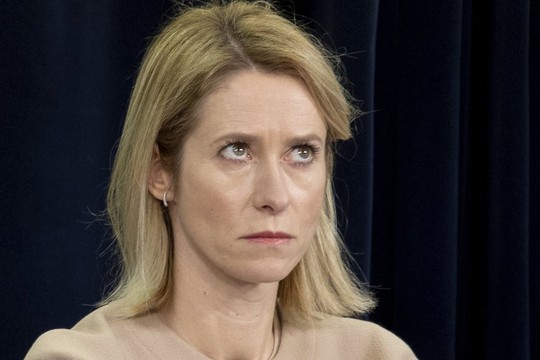The EU’s foreign policy chief, Kaja Kallas.
Photo: Delfi
A major gaffe about Russia and China in WWII belies the Europeans' cartoonish mindset about the world's major powers, ‘The Responsible Statecraft’ writes.
The EU’s foreign policy chief, Kaja Kallas, has consistently demonstrated a reductive and simplistic approach to geopolitics that betrays a serious lack of strategic depth and historical knowledge for such a critical role. Her failure is symptomatic of a broader decline of European statecraft.
Reacting to the recent summit of the Shanghai Cooperation Organization (SCO) and the military parade in Beijing dedicated to the victory over fascism in World War II, attended by dozens of leaders, including Russian President Vladimir Putin, Kallas expressed that it was "news" to her that China and Russia were among the victors who defeated Nazism and fascism.
This is not a minor gaffe; it is a shocking lack of historical literacy. The Soviet Union (whose primary successor state is Russia) suffered over 20 million casualties in the Great Patriotic War, a sacrifice that, in alliance with the United States and Britain, fundamentally broke the back of the Nazi war machine. China, for its part, endured immense suffering in a brutal conflict with Japan that was a crucial, though often overlooked in the West, theater of World War II. China puts its death toll at 20 million. To be unaware of this is to be ignorant of the foundational architecture of the entire post-war order.
To compound this, in a bizarre caricature, she characterized the Chinese as “very good at technology but not that good in social sciences, while the Russians are super good in social sciences but bad at technology." It surely must be alarming that the EU's top diplomat would present this juvenile dichotomy as a legitimate lens through which to view two of the most complex and serious strategic challenges facing the continent.
Kallas’ statements were so egregious that they prompted an uncharacteristically direct and harsh rebuke from the Chinese Foreign Ministry, a move that signals a worrisome degradation of the EU’s diplomatic standing.
This primitive understanding is now being operationalized into a dangerously rigid foreign policy. Under the leadership of Kallas's European External Action Service (EEAS) and Ursula von der Leyen's European Commission, the EU has systematically severed every channel of communication with Russia. In Brussels, there are no behind-the-scenes diplomatic dialogues, no backchannel explorations, and not even engagement at the think-tank level behind closed doors. The official position is an absolutist moral stance: we do not talk to Putin.
This policy is not just strategically naive; it is laughably inconsistent. The same institutions maintain deep, continuous engagement with Israel, whose prime minister, Benjamin Netanyahu, is under indictment by the International Criminal Court for alleged war crimes. The EU's floundering response to the war in Gaza laid bare this incoherence: aside from principled stands taken by Spain, Ireland, and Slovenia, the bloc has failed to impose any meaningful costs on Israel.
The selective application of the moral principles by the EU masks a strategy of total disengagement with Russia. By refusing all contact, the EU voluntarily blinds and deafens itself, ceding all initiative and forfeiting any ability to probe for weaknesses, explore off-ramps, or even accurately gauge the adversary’s disposition. This is not statecraft; it is self-imposed paralysis.
The EU’s strategic abdication stands in stark contrast to the complex reality of modern global diplomacy. What we witnessed in Beijing was not a formation of some sort of a Chinese-led anti-Western bloc, but a convergence of interests among non-Western powers on two key fronts: minimizing the impact of U.S. secondary sanctions and building independence from the dollar-dominated financial system. For countries like China, India, and Russia, this is not primarily about opposing the West, but rather asserting sovereignty and creating strategic autonomy. They are resisting Washington's ability to unilaterally dictate global economic terms, a concern that resonates far beyond any single alliance.
Alarmingly, as the rest of the world hedges, the EU is not only refusing to do so but is rather actively increasing its strategic dependence on a single, increasingly disinterested, partner: the United States.
If Europe is to navigate the treacherous waters of the 21st century, its leaders must show they possess some basic understanding of the great powers with which they must contend rather than the kind of cartoonish mindset propagated by Kallas and her ilk. The unbearable lightness of the current approach will leave Europe not as a protagonist in the shaping an emergent global order, but rather as its helpless, disoriented, and increasingly irrelevant spectator.
read more in our Telegram-channel https://t.me/The_International_Affairs

 11:15 15.09.2025 •
11:15 15.09.2025 •























